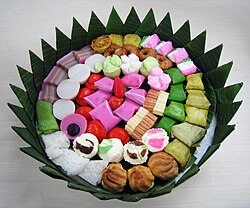|
Jajan pasar Jajan pasar (Javanese: market snacks) refers to traditional Javanese cakes sold in Javanese markets.[1] EtymologyJajan in Javanese can mean 1) to buy food; or 2) snacks/food for sale, while pasar means "market".[2] Jajan pasar thus means "snacks/food sold in the market". There are different types of snacks sold in traditional markets in Java: jajan pasar, kue, bolu, and roti. Jajan pasar refers to native Javanese snacks; kue (from Chinese gao; kwe) refers to western cakes and steamed cakes of Chinese origin; bolu (from Portuguese bolo) refers to sponge cakes and other types of cakes with a similar texture; while roti (from Sanskrit rotika) refers to baked goods in general.[2][3][4] However, in urban areas, the word "kue" is used to refer to all kinds of food products mentioned above.[5] This happened due to a strong influence of Chinese descendants' language use in the areas. More than 90% of Chinese descendants in Indonesia (who may not speak fluent Chinese, but would incorporate some Chinese words into their speech) live in the cities, where Indonesian language is spoken as a lingua franca. The word "kue" was later adopted to the "Great Indonesian Dictionary" (KBBI) to refer to all kinds of snacks, no matter the origins.[6][7] The use of kue instead of jajan pasar, has become increasingly widespread as more suburbs and villages become urbanized, blurring the lines between what constitutes as ethnic Javanese food and what's considered peranakan (Chinese-influenced); something that might come across as cultural erasure.[5][8][9] Types of JajanSee alsoReferences
|